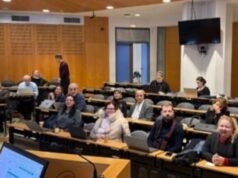 BY SHARON VAN WYK
BY SHARON VAN WYK
Having read Geoffrey Lipman’s views on what he calls sustainable “travelism” I would like to add a point of view from the southern reaches of the Dark Continent, Africa, which may put into perspective some of the points Geoffrey raises.
Firstly, I have to say that I am a supporter in principle of sustainability, and of putting “green before growth,” but living and working in Africa, and traveling throughout its sub-Saharan expanses over the last 40 years has provided me with an altogether less Utopian outlook and one which may burst a few bubbles.
No matter how admirable the ethics of sustainable growth and development, and how cognizant the “west” has become of the need to adapt and evolve the way we live, work, and play to be less impactful on the planet on which we depend, the simple fact is that we are fighting a losing battle. Sustainability, in its present form at least, is a myth.
The brand of sustainability we are practicing is delaying a process rather than arresting it completely. Why? Because there are simply too many human beings on this planet to enable us to stop what we have started, and of those human beings, the vast majority are living below what those in the developed nations commonly call the poverty line, with little or no education and, therefore, no direct or meaningful input into the governmental systems they are bound by other than casting a vote (in democratic countries).
I agree that we, as an industry, now largely recognize the need for sustainability (which Geoffrey so aptly likened to an elephant) but we still largely ignore the elephant in the room and that’s the need to protect and conserve the one thing we are running out of rapidly – space.
Growth, by its very nature, is not sustainable because eventually we will run out of space – space to build, space to work, space to play, space to expand into, space to put aside for “nature.” Space is not a renewable resource. It is finite. Here in Africa, where I live and work, it is perhaps the most valuable commodity, next to water. And it is the one thing that draws tourists in their millions… The sweeping great plains of East Africa, the impenetrable forests of Congo, Uganda, and Rwanda, the vast arid beauty of the Kalahari and Namib deserts… But year by year these spaces are put under more and more pressure by human expansion.
Tourism is part of that expansion, and no matter how much we would like to think that we can touch the Earth lightly, there is simply no way to not make an impact, no matter how small. I would challenge anyone who has been there not to marvel at the miracle that is the Maasai Mara at the peak of the annual wildebeest migration. But when darkness falls and the lights of countless resort-type developments on the gentle hills surrounding the plains becomes inescapable, where is the attraction? You may as well be in Central Park Zoo for all of the spirit of wilderness it conveys.
This industry has to be accountable for its actions. We strive to attract more and more people to the world’s last wild places – at what cost? And why? To show them the beauty and majesty of this planet in its natural state or to make money? I don’t think there is a tourism operator on this planet that runs their business as a charitable institution. We provide a service for people who want to escape and explore, and we charge for that privilege. Money is the single biggest driver of human society and expansion and has been since it and the economic systems it has spawned came into being.
We make money from showing people different places, cultures, and sights and from giving them experiences beyond the realm of their everyday lives. A few of us would like to think that we change a few mindsets in the process and even create a few activists along the way. In Africa we have an enormous number of “repeat” visitors – people who have been “wowed” by the continent’s incredible natural resources to the extent that they return year after year in order to get their “fix” of the wilderness experience and even contribute to its protection. But that wilderness is getting smaller year on year. And we have to own up to our role in helping to drive that.
Consider the Victoria Falls and the two countries which share it – Zimbabwe and Zambia. Forty years ago there was minimal development on both banks of the mighty Zambezi river and virtually no traffic on the river itself above the falls. Livingstone was a small border town with little infrastructure, and its neighbor – the town of Victoria Falls – was little more than a weekend escape for then Rhodesians.
Now a concrete jungle competes with a somewhat diminished rain forest on both sides of the falls. The air is filled with the sound of helicopter rotors and the river is choked with pleasure vessels bearing tourists on cruises. Hotel developments line the banks of the upper Zambezi on both sides for a considerable distance. And floodlights have been placed in the Batoka gorge below the falls to light them at night. Both towns on both sides of the river have become tourism hubs for their respective countries. Developments abound. Communities prosper. Tourism stakeholders reap the rewards.
Where do we draw the line? Is there a point at which we say “enough?” In a truly sustainable model there has to be a time when critical mass is achieved, above which anything more would render that model not sustainable, not just from a business perspective but from an environmental one. Once land is cleared for a new tourism development the reality of sustainability diminishes and the myth kicks in. The truth is that the only truly green development is no development at all. Is the tourism industry ever going to say yes to no development?
While tourism is held up as the unilateral tool for community upliftment, poverty eradication and sustainable growth, especially in rural areas, who is looking at the bigger picture? Human-wildlife conflict is increasing in every corner of this continent (Africa), we are down to fewer than 20,000 lions left in the wild, mostly through a loss of range and deaths at the hands of cattle farmers (even though research has shown that hyena are the main culprit where stock losses are concerned), our wild dog population is probably less than 6,000. These are our apex predators. If we lose them, our eco-systems collapse.
Tourism, and particularly eco-tourism, has a huge role to play in this scenario, but to date it is missing the boat completely by choosing to put the words green and growth into the same sentence and clinging to the myth of sustainability rather than recognizing exactly what is and what is not actually sustainable.
Sustainability is not something which can be measured in purely scientific or economic terms. Indeed, I would argue that much of it is instinctual at almost a primeval level. Our forebears understood implicitly how much they could take from the land without adversely affecting it and some tribal societies still exist in this state of harmony, far from the reach of modern existence.
For all but a few these instincts have become obfuscated by greed to the extent that humanity is likely past the point of no return and beyond salvation and no amount of political rhetoric or gatherings of world leaders can change this.
We need to ask why we do what we do, not examine how we do it. Why do we do what we do? It’s a question particularly pertinent to the tourism industry. Why do we need more people to come and visit our countries? Why do we want more hotels? Why do we want to find a piece of pristine wilderness and put a five-star lodge on it rather than leave it just the way it is? Why, when we know what a carbon footprint is, do we insist on creating one where none existed?
Geoffrey speaks of the industry harnessing the “immense, positive reality” of sustainable tourism and travel. I agree there is much to be said for all moving in the same direction with a united goal, but is anyone checking to make sure the destination we are headed to is the best option? After all, progress isn’t automatically a positive thing.
When I travel in Africa I occasionally come across the most incredible stories which give me hope that perhaps all is not lost and that there may be a better future for those who will come after me, where real sustainability is a given, and politics and greed have no role to play. They are invariably driven by outstanding human beings who are prepared to buck the system, fly under the political radar, fight against the odds, and give their all to make lasting change for good a reality without any thought of personal gain – quite the opposite of the people who supposedly govern them.
As a global industry, tourism is largely regarded by politicians and governments as insignificant, much in the same way that environmental policy is seen as a hindrance to economic growth. The world’s leaders only pay it lip service when it is politically necessary or prudent to do so, largely engaging in filibustering to avoid changing the status quo of power. For most First World countries, recycling has become a “green” placebo for the lack of political will to tackle the real issues which face us as a species. The population explosion is swept under the carpet, renewable energy offers no financial rewards, climate change is no longer regarded as a crisis, and the price of oil still drives economic policy. Land is owned and wealth and power go hand-in-hand – all to benefit a few at the expense of the majority.
Without the political will to understand and fully grasp the impact we, as a species, are making on this planet and while political agendas are still tied to inherently flawed economic systems and non-renewable resources, there can be no sustainability in any aspect of our lives, let alone “travelism.” And while we, as societies, still support fiefdom and greed as pillars of our existence, what green there is left on this planet is ultimately doomed, and tourism, travelism, or whatever you choose to call it will only add to its demise.
We are part of the problem, and only once we understand that we are part of the problem can we find a sustainable solution.
The author, Sharon van Wyk, is an award-winning writer and natural history film-maker based in Pretoria, South Africa. She specializes in the relationships between “responsible” eco-tourism, conservation, and rural communities in sub-Saharan Africa. She has been involved in the South African tourism industry for the last two decades and has served on the national executive committee of the Southern Africa Tourism Services Association (SATSA) as Chairperson of the Gauteng chapter.
Source http://www.eturbonews.com/











